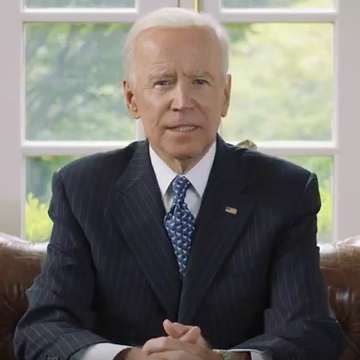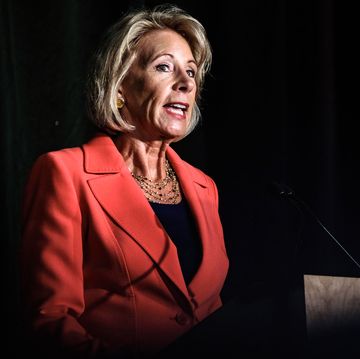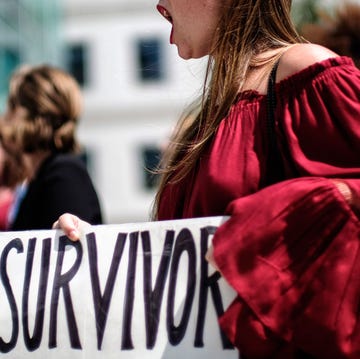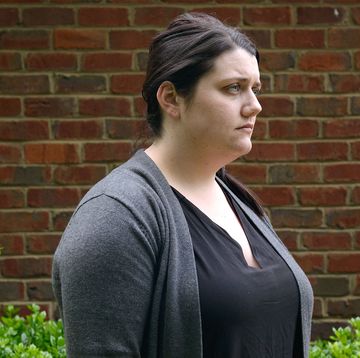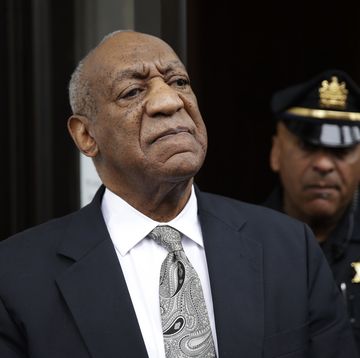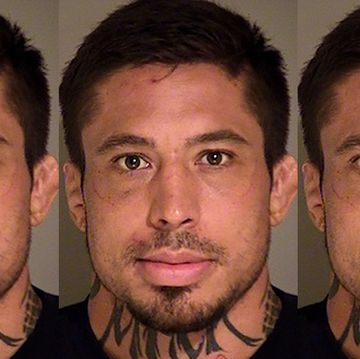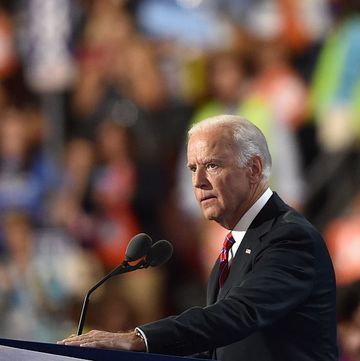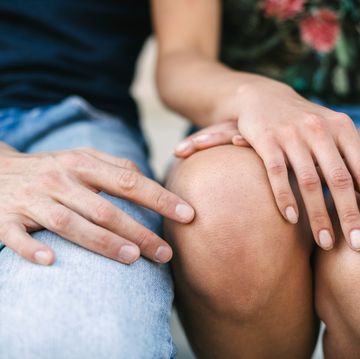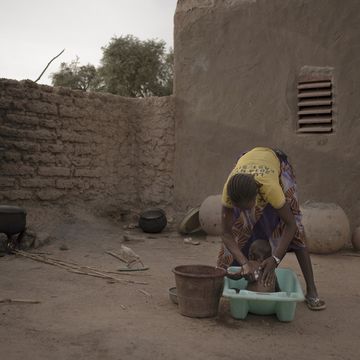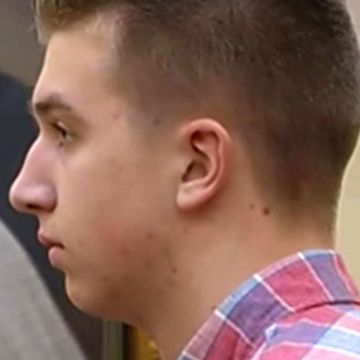A few weeks into her freshman year at Amherst College, Lilly Jay was raped — and her first instinct was to tell no one. Yesterday she stood at a podium and talked about what happened in the most public way possible: at the White House's introduction of "It's On Us," a new campaign to change rape culture. What she said was so perfect that Vice President Joe Biden — who wrote the Violence Against Women Act 20 years ago — said he had "never heard anyone say as eloquently as you just did what's it's like" to have to constantly relive sexual assault.
"Using your experience to protect others from rape is so empowering and so important, but it also tethers you to your pain," she said. "In order to be heard, I had to talk about the night in which violence silenced me. When non-survivors step up and say, 'I don't need to be hurt to care about assault,' they give survivors permission to move our hearts from the edge of our sleeve to where it belongs. Hearing my friends and professors say, 'You don't need to stay hurt for us to take this seriously' freed me to finally mourn for my freshman self."
Valerie Jarrett, a special adviser to the president and co-chair of the White House Sexual Assault Task Force, took those remarks personally: Her own daughter attended Amherst and lived in the same dorm Lilly Jay did. "I looked at her and looked at her parents and thought, That could easily be me," she says. Jarrett talked to Cosmo about the importance of being an ally and what you can do to help.
What's the impetus for "It's On Us"?
The campaign is designed to change our culture — we have [a] culture of both tolerance and silence around sexual assault. The young woman who introduced the vice president today made this point. She was raped her first couple of weeks on campus her freshman year and the guy who did it lived down the hall from her. And she didn't report it until he raped somebody else. And that's what happens — you blame yourself; there is a lot of misplaced guilt. You didn't do anything wrong at all. We want the women and men — because this happens to men too — to know that they are not alone. We all have a role to play in helping victims to become survivors.
How does one individual change rape culture? What behaviors would you like to see change in the people who watch this campaign?
The first thing we want them to do is pledge to join the campaign — we don't want them to watch it, we want them to be a part of it. You can go on ItsOnUs.org and make a pledge that you are going to be part of a solution. We are looking for role models such as the president and the vice president, who reiterated today that real men do not abuse women.
By pledging to be a part of the campaign, you say you will talk to your peers, you will become someone who talks about sex assault being a crime, that it should not occur on our college campuses. Men should not be talking about women in debasing and derogatory terms, including when they are not with women. So the conversations that men have when they are among other men, in the locker room, the fraternity house, wherever, should be about respecting women. So if you are a guy who signs the pledge, that's what you commit to do.
Another important part of the pledge is that you won't be a bystander. We hear these terrible stories about young people who are drinking at parties and oftentimes liquor is used as a tool to enable sexual assault, and people stand around and watch it happen. Instead, how about you offer her a ride home? How about you take her arm and walk her out of the situation? How about you tell your friends, "Leave her alone!"?
College campuses are a microcosm of our society. We believe that if we can create an ownership of this on campus and change the culture campus by campus, that's how we will change the culture of our society. If students are sexually assaulted during those tremendously important years, it is going to inhibit their ability to become productive citizens. Lilly said she basically lost her whole freshman year of college to this, pantomiming through her classes because she was rightly so affected by the trauma. That's not what students are in school to do. They are there to be safe, to learn, to thrive, and to flourish.
What has been the reaction of men to the campaign? Do you fear defensiveness or backlash from institutions like fraternities and athletic departments?
As part of our Sexual Assault Task Force, we reached out and talked to every single person we could, and a series of recommendations emerged, and one of them was to empower everybody to feel this mutual sense of responsibility toward one another to prevent sexual assault. I have been extraordinarily struck by the enthusiasm and passion that comes from the men who have engaged with us, both representatives of fraternities [and] of alumni associations run by men who are concerned about their reputations of their colleges and universities that they love so dearly. Normally if we did something on sexual assault, we'd see 95 percent of the audience would have been women. Today it was half women and half men. We had representatives from GQ magazine and Viacom and the NCAA, the Big Ten, the Big Twelve, all of the different college athletic leaders, all men and all committed.
Given the hyper-politicized age we live in, do you worry that attention from the White House on this issue might politicize it — in other words, because the president supports the message, others will dig in against something that should not be controversial?
What makes this different — because you are right, a lot of people see perfectly good things we do through that lens — is that it is a grassroots effort. The energy for this is coming from the college campuses, and we are simply amplifying what they are already doing.
And I'll tell you another reason why I think this doesn't get politicized. Sure, we are all professionals and we have our responsibilities, but so many of us are also parents. Lilly Jay attended the same college where my daughter was a freshman 10 years ago, and she majored in the same major and lived in the same dorm. We talked about the professors she had. This really strikes a chord. When the president talked, he mentioned his two daughters, one of whom is a junior and is looking at colleges right now. I haven't heard today in Washington — where you know our friends on the other side of the aisle are often quick to criticize — I haven't heard a single criticism yet about this. I think that's a really good sign.
Sex assault prevention has typically targeted women with the implicit message that they are responsible for preventing their own assault. What brought about this change in finally messaging away from victim-blaming to focus on bystanders and potential perpetrators?
I think it's the result of a lot of people who have been doing research in this area for a very long time, who recognize that, for example, usually the men who do this are repeat offenders. That's what Lilly said today. She didn't come forward until the man who raped her raped somebody else. Because they are serial offenders, that kind of data, when it gets out, helps women understand they did absolutely nothing wrong. This has been a slow-motion build-up to recognize that we need to stop putting the burden on women. Obviously the same thing applies to domestic violence, which the headlines are full of this week.
I think our society is moving in a really positive direction. Let's hold the perpetrators accountable. This is the only crime you find where historically the blame has been placed on the victim. The vice president has been extraordinarily outspoken for 20 years on the idea that it doesn't matter what you are wearing, or what you had to drink, or if you are at party late at night — if you say no, the man must stop.
What is your opinion of the new "Yes Means Yes" policy in California, requiring colleges to use the standard of affirmative consent in their sexual assault policies?
I think it's really interesting. I like the idea because the challenge here is that when liquor is involved, and people are relying on body language, there is room for ambiguity. And then again, the burden again is put on the woman to say no. Lynn Rosenthal, the White House advisor on violence against women out of the vice president's office, has been studying what California did, and we've been hearing of a few other places looking at similar laws. So it's probably going to be something that passes state by state. We're going to be watching to see how it goes. California has a large number of colleges and universities, so they will have a pretty good database quickly to see whether or not it's an effective strategy. But it's certainly intriguing.
Students arrive at orientation with a lot of cultural messages that are hard to undo with a single pledge. Don't we need to reach younger kids too?
That has been part of our plan all along. When the president announced the task force back in January, he said that this begins with what we are teaching our children about respecting women. For you who have sons out there, you have to teach them that you must respect women and value them. Today he reiterated that message. This is one place on the continuum where we can intervene and be vigilant. [Secretary of Education] Arne Duncan has also been looking at the issue in K–12 schools and has issued guidance there. We are very mindful that this begins when you are born. My hope would be that parents would sign a pledge and commit to make sure they are raising their sons with full respect for women. There isn't anyone who cannot participate in this "Its On Us" campaign.
RELATED:
17 Beliefs About Sexual Assault That Are Totally Wrong
What Can Colleges Actually Do to Prevent Sexual Assault?
18 Questions to Ask About Your School's Sexual Assault Policy
Follow Sara on Twitter.



